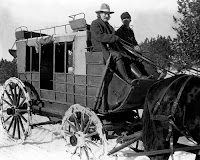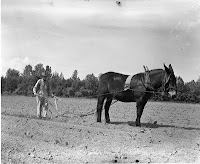
The other day a former stagecoach driver told me that a single bottle of my elixir saved his life. He was transporting mail between Abilene and Tucson, he said, when he was set upon by a dozen masked gunmen.
The gunmen began shooting, and he returned fire. He soon ran out of bullets, though, and commenced to throwing everything he could spare at them – canned beans, parasols, whatever was handy. Nothing helped, until he chanced upon a bottle of
Wizard Water©. He threw that, too, but the bottle slipped out of his hand and fell backwards, towards his own team of horses. It hit the rigging, broke, and splashed Wizard Water
© all over their legs. Within a minute those legs grew to five times their normal size.
Soon every gallop took the coach high above the cactus. The vehicle would sail through the air for a few seconds, then slam back into the trail. At one point the team topped some telegraph poles. The gunmen slowed their shooting, fascinated, and probably unsure of where to aim.
Finally, the driver spotted a train in the distance. He urged the horses in that direction. They caught up with the locomotive, leaped, and the entire stagecoach landed in an open car of unshucked corn.
The train pulled ahead of the highwaymen. Out-run and out-leaped, the bandits gave up pursuit.
Over the next several hours, the legs of the horses began to revert to a normal size. By the time the locomotive finally stopped, they looked like any other set of equines buried waist-deep in grain. When the stationmaster saw the coach in the corn, he insisted that the driver pay full passage for himself, the stagecoach and the team.
This happened many years ago, said the driver, who quit the postal service shortly thereafter to join the Texas Rangers. “I wanted a job that was less dangerous than transporting mail," he said. "I can face armed bandits. What bothers me is surprise cargo. Also, when we started clearing the tops of the cactus, I couldn't help thinking that the good Lord did not intend for us to drive to heaven."
 It is well known that one can protect newly sheared sheep from skin infections and pests such as scabies by dipping them in a steaming bath of tobacco juice, sulphur and hot water.
It is well known that one can protect newly sheared sheep from skin infections and pests such as scabies by dipping them in a steaming bath of tobacco juice, sulphur and hot water.






